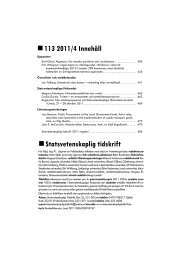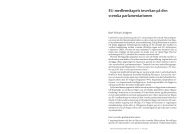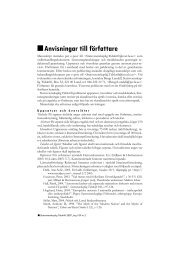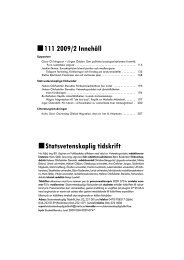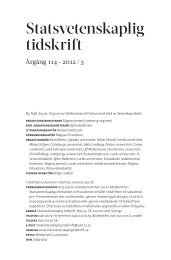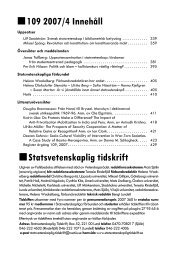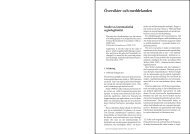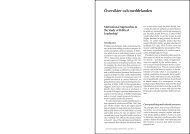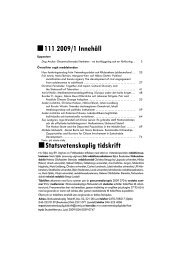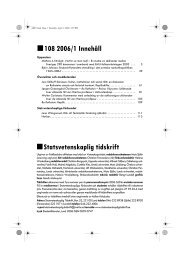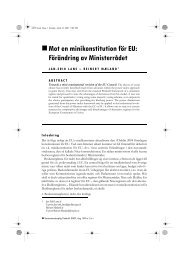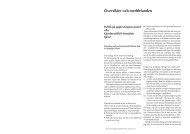Hela nummer 2007/1 (PDF, 2047 kb) - Statsvetenskaplig tidskrift
Hela nummer 2007/1 (PDF, 2047 kb) - Statsvetenskaplig tidskrift
Hela nummer 2007/1 (PDF, 2047 kb) - Statsvetenskaplig tidskrift
You also want an ePaper? Increase the reach of your titles
YUMPU automatically turns print PDFs into web optimized ePapers that Google loves.
st071.book Page 77 Sunday, March 4, <strong>2007</strong> 5:48 PM<br />
planned/formalized/compromised – and,<br />
concomitantly, more symmetric.<br />
However, it might be useful to make a<br />
step further in order to discern how symmetry<br />
and asymmetry are intertwined and<br />
intermingled. The first way of reasoning in<br />
this direction would be to assume that<br />
within the framework of Yeltsin-time<br />
asymmetric federalism, there was some<br />
degree of symmetry since all regions were,<br />
to some extent, in the same position and,<br />
hence, were equal in being parts of “take<br />
as much sovereignty as possible” doctrine.<br />
Also indicative are Johnny Rodin’s<br />
statements that after 2006 regional leaders<br />
gained even more powers, as well as those<br />
assuming that there are some elements of<br />
decentralization under Putin – could they<br />
mean that the current symmetry of today<br />
might evolve into a new form of asymmetry<br />
of tomorrow?<br />
The second pathway of deepening the<br />
discussion of symmetry and asymmetry<br />
would be to ask whether the implementation<br />
of the symmetric federalism concept<br />
will imply that Russia is still a federation?<br />
Doesn’t the symmetric concept of federalism<br />
efface the very idea of federalism as<br />
such?<br />
The third research track would be to<br />
make an attempt at relating to each other<br />
the two semantic couples – symmetry/<br />
asymmetry and politicization/de-politicization.<br />
De-politicization seems to better<br />
correspond to the logic of symmetry, with<br />
better acceptance of the reform and greater<br />
cooperation among different bodies. A<br />
de-politicized pattern of power is grounded<br />
in a pure economic rationale and does<br />
not recognize exceptional moves based<br />
upon ethnic specificity. Politicization, on<br />
the contrary, seems to be closer to the logic<br />
of asymmetry, with more conflicts between<br />
the agents involved.<br />
77<br />
There is, finally, one more important set<br />
of questions to be asked: is the system<br />
which does not stipulate special arrangements<br />
with specific regions more or less<br />
effective? More or less conflictual? Does<br />
not symmetry constitute a certain hindrance<br />
to a variety of experimental and innovative<br />
practices? It is from here that I<br />
will move to discussing the nature of Putin’s<br />
regime in Johnny Rodin’s interpretation.<br />
The first impression is that the author<br />
gives a number of characterizations of<br />
Vladimir Putin: he is depicted as a policy<br />
entrepreneur, a policy-maker, or simply a<br />
politician. Yet on at least one occasion<br />
Johnny Rodin clarifies that Putin is not a<br />
policy innovator but rather a policy entrepreneur<br />
with a political will.<br />
Yet this statement does not seem to be<br />
sufficient, since it leaves open a key question:<br />
is Putin a Political Subject (a Sovereign<br />
in terms of Carl Schmitt, a Master in<br />
terms of Slavoj Zizek), or a mere instrument<br />
of an anonymous/faceless/invisible<br />
structure? At some point Johnny Rodin<br />
seems to be inclined to admit that Putin is<br />
simply part of the structure: “Ideas now<br />
have their champion”, and later more specifically<br />
– “Putin fitted the picture”. In<br />
theoretical terms, this reminds of what<br />
was called “de-subjectivization” by Slavoj<br />
Zizek: the subject posits himself as an instrument<br />
of a certain structure. “It is as<br />
though the sword itself performs automatically<br />
its function of justice” (Zizek<br />
2003: 29). The subject, in other words, instead<br />
of intervening in reality, just lets<br />
things develop as they are. Rephrasing<br />
Zizek, one may assume that Putin is “reduced<br />
to the passive observer of” his own<br />
acts.<br />
The fact that Johnny Rodin’s book<br />
leaves open a number of questions, seems<br />
to be natural for this kind of research due<br />
to the controversial character of its sub-<br />
■ L ITTERATURGRANSKNINGAR



